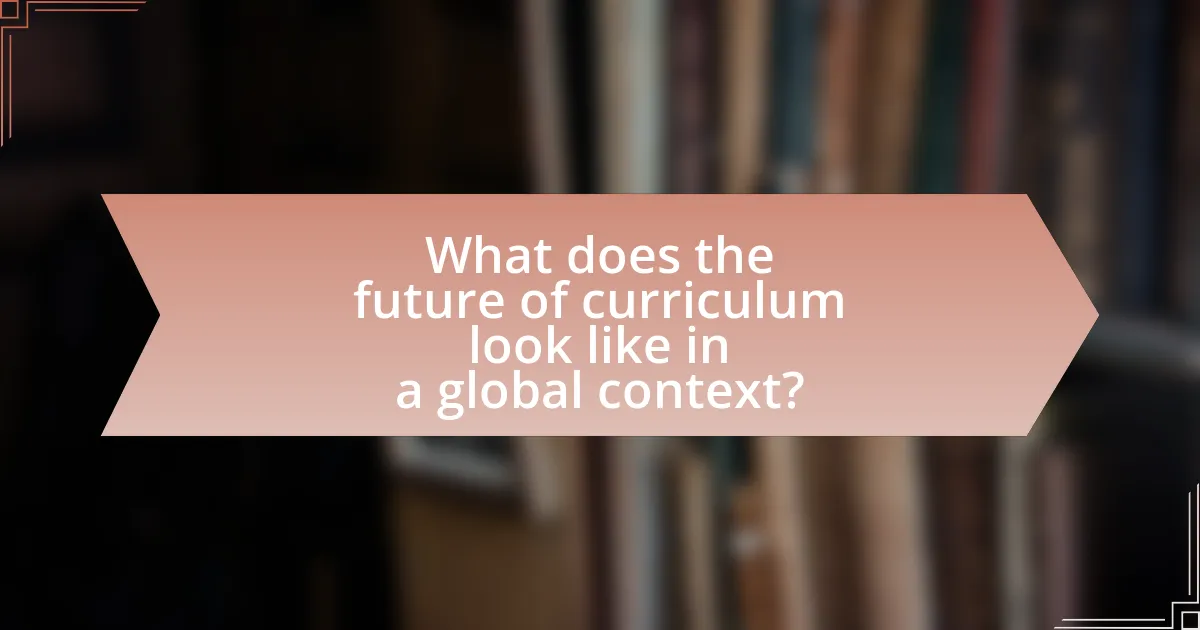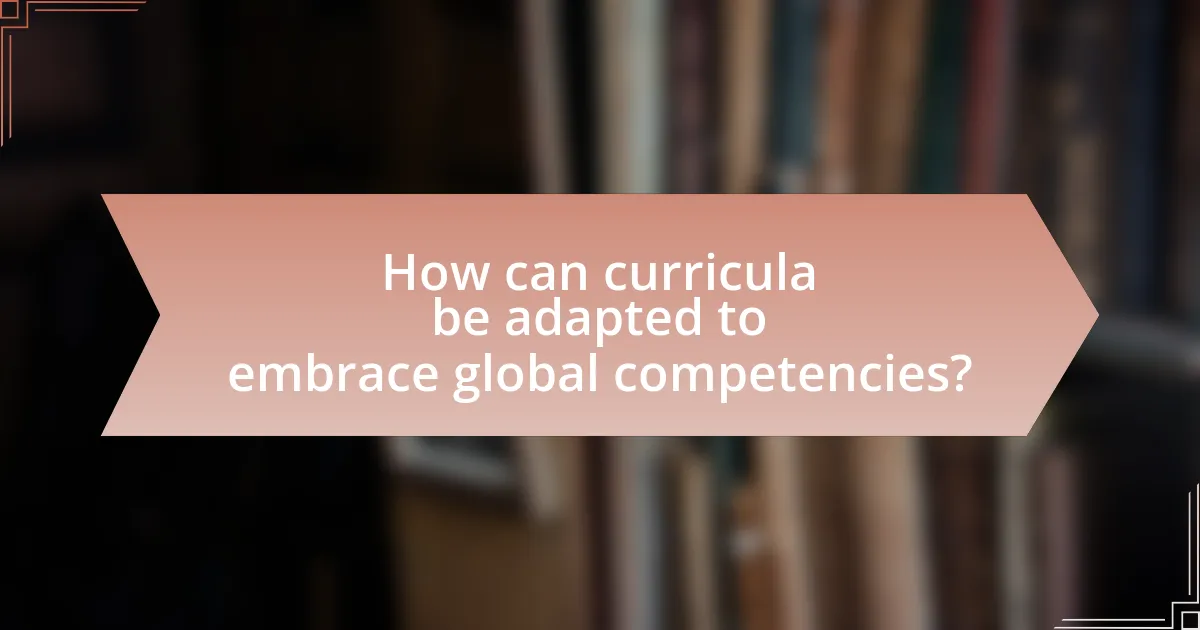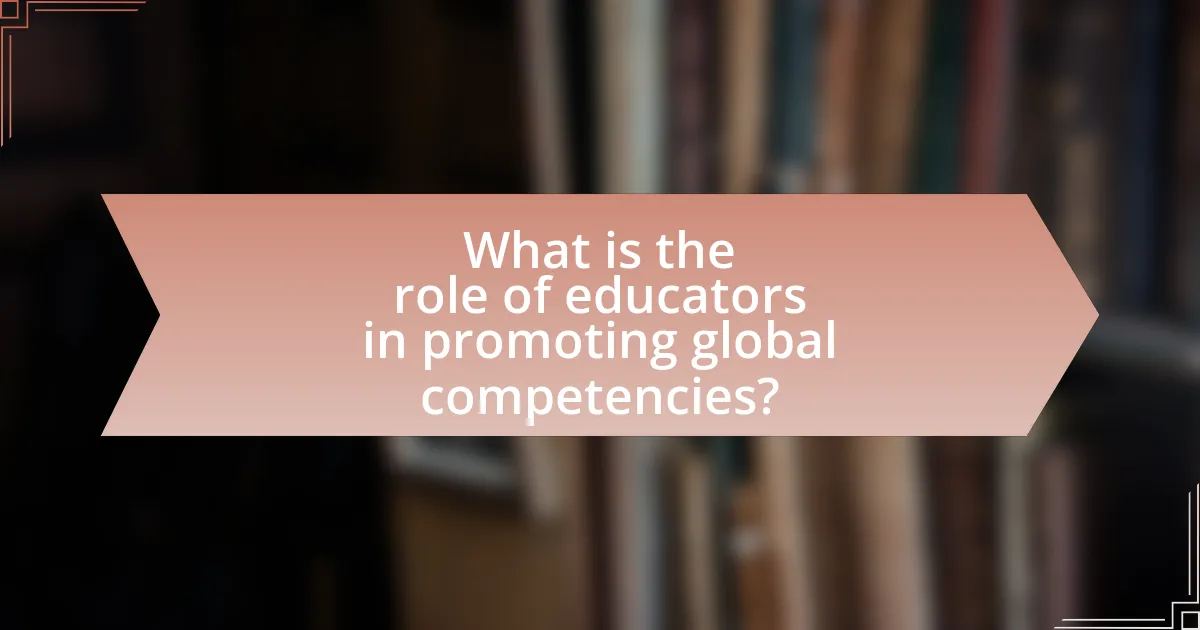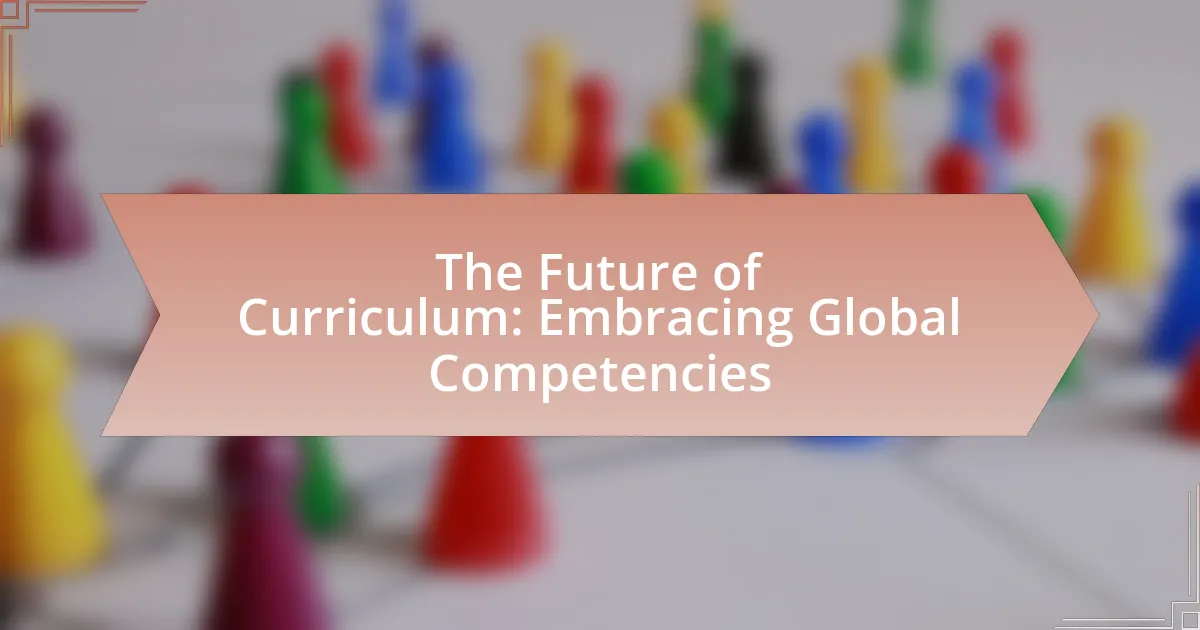The article focuses on the future of curriculum development with an emphasis on global competencies, which include critical thinking, collaboration, and cultural awareness. It outlines the necessity for educational systems to adapt in order to prepare students for a globalized workforce, highlighting the importance of skills such as problem-solving and emotional intelligence. The article also discusses the challenges educators face in integrating these competencies, the impact of cultural differences on curriculum design, and the resources needed for effective implementation. Furthermore, it explores innovative teaching methods, assessment strategies, and the role of community partnerships in enhancing global competency initiatives, ultimately demonstrating how these competencies significantly improve student outcomes and workforce readiness.

What does the future of curriculum look like in a global context?
The future of curriculum in a global context will increasingly emphasize global competencies, integrating skills such as critical thinking, collaboration, and cultural awareness. Educational systems worldwide are recognizing the need to prepare students for a globalized workforce, which requires adaptability and intercultural communication. For instance, the World Economic Forum’s “Future of Jobs Report 2020” highlights that skills like problem-solving and emotional intelligence are essential for future employment, prompting curricula to evolve accordingly. Additionally, UNESCO advocates for education that fosters global citizenship, indicating a shift towards curricula that not only impart knowledge but also cultivate responsible global citizens.
How are global competencies defined in educational settings?
Global competencies in educational settings are defined as the knowledge, skills, attitudes, and values that enable individuals to navigate and contribute to an interconnected world. These competencies encompass critical thinking, communication, collaboration, and cultural awareness, which are essential for success in a globalized society. Research by the Organisation for Economic Co-operation and Development (OECD) highlights that fostering global competencies prepares students for diverse environments and enhances their ability to engage with complex global issues.
What key skills are included in the concept of global competencies?
Key skills included in the concept of global competencies are critical thinking, communication, collaboration, cultural awareness, and adaptability. These skills enable individuals to navigate and succeed in diverse environments. For instance, critical thinking allows for effective problem-solving in complex global issues, while communication skills facilitate interaction across cultures. Collaboration is essential for teamwork in international settings, cultural awareness fosters respect and understanding among different societies, and adaptability ensures resilience in the face of change. These competencies are increasingly recognized as vital for personal and professional success in a globalized world.
Why are global competencies essential for students today?
Global competencies are essential for students today because they equip them with the skills necessary to thrive in an interconnected world. As globalization increases, students must navigate diverse cultural contexts, collaborate with individuals from various backgrounds, and address global challenges such as climate change and inequality. Research from the World Economic Forum indicates that 65% of children entering primary school today will work in jobs that do not yet exist, highlighting the need for adaptability and critical thinking, which are core components of global competencies. These competencies foster not only academic success but also social responsibility and cultural awareness, preparing students for future workforce demands and global citizenship.
What challenges do educators face in integrating global competencies?
Educators face several challenges in integrating global competencies, primarily including a lack of resources, insufficient training, and varying curriculum standards. The lack of resources, such as access to technology and materials that support global learning, hinders effective implementation. Additionally, many educators report feeling unprepared due to inadequate professional development opportunities that focus on global competencies. Furthermore, the absence of standardized curriculum frameworks across different educational systems complicates the integration process, as educators must navigate diverse expectations and requirements. These challenges collectively impede the ability to effectively teach and assess global competencies in the classroom.
How can cultural differences impact curriculum development?
Cultural differences significantly impact curriculum development by influencing the values, perspectives, and learning styles integrated into educational programs. For instance, curricula designed in collectivist cultures may emphasize group work and community involvement, while those from individualistic cultures may focus on personal achievement and critical thinking. Research by the Organisation for Economic Co-operation and Development (OECD) highlights that educational systems must adapt to reflect the cultural contexts of their students to enhance engagement and effectiveness. This adaptability ensures that diverse cultural backgrounds are respected and represented, ultimately leading to a more inclusive and relevant educational experience.
What resources are necessary for effective implementation of global competencies?
Effective implementation of global competencies requires a combination of trained educators, comprehensive curricula, technological tools, and collaborative partnerships. Trained educators are essential as they possess the skills to integrate global competencies into teaching practices, ensuring that students develop critical thinking, cultural awareness, and communication skills. Comprehensive curricula that include global issues and diverse perspectives provide a framework for students to engage with the world. Technological tools, such as online learning platforms and digital resources, facilitate access to global content and enable collaborative projects across borders. Collaborative partnerships with international organizations and local communities enhance real-world learning experiences, allowing students to apply their knowledge in diverse contexts. These resources collectively support the development of global competencies, preparing students for a interconnected world.

How can curricula be adapted to embrace global competencies?
Curricula can be adapted to embrace global competencies by integrating interdisciplinary approaches that focus on critical thinking, cultural awareness, and collaboration. This adaptation involves incorporating global issues into the curriculum, such as sustainability, social justice, and economic interdependence, which fosters students’ understanding of diverse perspectives. Research by the Partnership for 21st Century Skills highlights that curricula emphasizing skills like communication, creativity, and cross-cultural understanding better prepare students for a globalized workforce. Additionally, implementing project-based learning that connects students with international communities can enhance their global competencies, as evidenced by programs like the Global Learning and Observations to Benefit the Environment (GLOBE) initiative, which engages students in real-world environmental science projects across different countries.
What innovative teaching methods support global competencies?
Innovative teaching methods that support global competencies include project-based learning, collaborative learning, and experiential learning. Project-based learning engages students in real-world problems, fostering critical thinking and problem-solving skills essential for global citizenship. Collaborative learning encourages teamwork and communication among diverse groups, enhancing cultural awareness and interpersonal skills. Experiential learning, through internships or study abroad programs, provides practical experiences that deepen understanding of global issues. Research by the Partnership for 21st Century Skills highlights that these methods effectively prepare students for a globalized workforce by developing essential skills such as adaptability, creativity, and cross-cultural communication.
How does project-based learning enhance global competencies?
Project-based learning enhances global competencies by fostering critical thinking, collaboration, and communication skills essential for navigating a globalized world. This educational approach engages students in real-world projects that require them to work with diverse teams, thereby promoting cultural awareness and adaptability. Research indicates that students involved in project-based learning demonstrate improved problem-solving abilities and a deeper understanding of global issues, as evidenced by a study published in the “Journal of Educational Psychology” by Thomas Markham, which highlights the correlation between project-based learning and enhanced student engagement in global contexts.
What role does technology play in fostering global competencies?
Technology plays a crucial role in fostering global competencies by enabling access to diverse information and facilitating communication across cultures. It allows learners to engage with global perspectives through online resources, virtual collaborations, and interactive platforms. For instance, tools like video conferencing and collaborative software enable students from different countries to work together on projects, enhancing their understanding of global issues. Additionally, research by the World Economic Forum highlights that technology integration in education promotes critical thinking and problem-solving skills, essential for navigating a globalized world.
What are the best practices for curriculum design focused on global competencies?
The best practices for curriculum design focused on global competencies include integrating interdisciplinary approaches, fostering critical thinking, and promoting cultural awareness. Interdisciplinary approaches allow students to connect knowledge across subjects, enhancing their ability to understand complex global issues. Fostering critical thinking equips learners with the skills to analyze and evaluate information, which is essential in a globalized world. Promoting cultural awareness helps students appreciate diversity and develop empathy, crucial for effective communication in multicultural environments. These practices are supported by research indicating that curricula emphasizing these elements lead to improved student engagement and preparedness for global citizenship.
How can collaboration with international partners enhance curriculum effectiveness?
Collaboration with international partners enhances curriculum effectiveness by integrating diverse perspectives and best practices from various educational systems. This collaboration allows for the incorporation of global competencies, which are essential in preparing students for a interconnected world. For instance, research by the Organisation for Economic Co-operation and Development (OECD) highlights that curricula enriched with international insights lead to improved critical thinking and problem-solving skills among students. Furthermore, partnerships can facilitate access to resources, expertise, and innovative teaching methodologies, thereby fostering a more comprehensive and relevant educational experience.
What assessment strategies are effective for measuring global competencies?
Effective assessment strategies for measuring global competencies include performance-based assessments, project-based learning, and reflective assessments. Performance-based assessments evaluate students’ abilities to apply knowledge in real-world contexts, demonstrating skills such as critical thinking and collaboration. Project-based learning engages students in complex tasks that require problem-solving and teamwork, fostering global awareness and cultural understanding. Reflective assessments encourage students to analyze their learning experiences and articulate their growth in global competencies. Research indicates that these strategies not only enhance student engagement but also provide a comprehensive evaluation of their readiness to navigate a globalized world.

What is the role of educators in promoting global competencies?
Educators play a crucial role in promoting global competencies by integrating diverse perspectives and skills into the curriculum. They facilitate students’ understanding of global issues, cultural awareness, and critical thinking, which are essential for navigating an interconnected world. Research indicates that when educators incorporate project-based learning and collaborative activities focused on real-world problems, students develop the ability to communicate and work effectively across cultures. For instance, a study by the Asia Society found that schools emphasizing global learning saw significant improvements in students’ engagement and problem-solving skills, demonstrating the effectiveness of educators in fostering these competencies.
How can teachers be trained to incorporate global competencies into their teaching?
Teachers can be trained to incorporate global competencies into their teaching through professional development programs that focus on intercultural communication, critical thinking, and collaborative problem-solving. These programs should include workshops, online courses, and peer collaboration that emphasize real-world applications of global issues, such as climate change and social justice. Research by the Asia Society suggests that integrating global competencies into teacher training enhances educators’ ability to prepare students for a diverse and interconnected world, ultimately leading to improved student outcomes in global awareness and civic engagement.
What professional development opportunities are available for educators?
Professional development opportunities for educators include workshops, online courses, conferences, and mentorship programs. These opportunities are designed to enhance teaching skills, integrate technology, and promote global competencies in the classroom. For instance, organizations like the International Society for Technology in Education (ISTE) offer resources and training focused on digital literacy and innovative teaching practices. Additionally, many school districts provide in-house training sessions that align with curriculum goals, ensuring educators are equipped to meet the evolving demands of education.
How can educators foster a global mindset in their students?
Educators can foster a global mindset in their students by integrating diverse perspectives and global issues into the curriculum. This approach encourages students to engage with different cultures, languages, and worldviews, promoting empathy and understanding. Research indicates that programs emphasizing global education, such as the Global Competence Framework developed by the Asia Society, enhance students’ ability to think critically about global challenges and collaborate across cultures. By incorporating project-based learning that addresses real-world problems, educators can further develop students’ skills in communication and teamwork, essential for navigating an interconnected world.
What impact do global competencies have on student outcomes?
Global competencies significantly enhance student outcomes by equipping learners with essential skills for navigating an interconnected world. These competencies, which include critical thinking, cultural awareness, and collaboration, prepare students for diverse environments and global challenges. Research indicates that students who develop global competencies demonstrate improved academic performance, higher engagement levels, and increased employability. For instance, a study by the Asia Society found that schools integrating global learning into their curricula reported a 20% increase in student engagement and a 15% improvement in critical thinking skills. Thus, the incorporation of global competencies into education directly correlates with positive student outcomes.
How do global competencies prepare students for the workforce?
Global competencies prepare students for the workforce by equipping them with essential skills such as critical thinking, cultural awareness, and effective communication. These competencies enable students to navigate diverse work environments and collaborate with individuals from various backgrounds. Research indicates that employers increasingly prioritize these skills; for instance, a survey by the World Economic Forum found that 21st-century skills, including global competencies, are crucial for job readiness in a globalized economy. By fostering adaptability and problem-solving abilities, global competencies enhance students’ employability and readiness to meet the demands of modern workplaces.
What evidence supports the effectiveness of global competencies in education?
Global competencies in education are supported by evidence indicating that they enhance student engagement, critical thinking, and preparation for a global workforce. Research conducted by the Organisation for Economic Co-operation and Development (OECD) in the “Global Competency for an Inclusive World” report shows that students who develop global competencies demonstrate improved problem-solving skills and cultural awareness, which are essential in today’s interconnected society. Additionally, a study published in the “Journal of International Education in Business” found that curricula incorporating global competencies lead to higher student satisfaction and employability rates, as graduates are better equipped to navigate diverse work environments.
What practical steps can schools take to implement global competencies?
Schools can implement global competencies by integrating interdisciplinary curricula that emphasize critical thinking, collaboration, and cultural awareness. This approach encourages students to engage with real-world issues, fostering skills necessary for global citizenship. For instance, incorporating project-based learning that addresses local and global challenges allows students to apply their knowledge in practical contexts. Research shows that such methods enhance student engagement and retention of information, as evidenced by a study from the Partnership for 21st Century Skills, which highlights the effectiveness of skills-based education in preparing students for a globalized workforce. Additionally, professional development for educators focused on global competencies equips teachers with the tools to effectively guide students in these areas.
How can schools create a supportive environment for global learning?
Schools can create a supportive environment for global learning by integrating diverse perspectives into the curriculum and fostering intercultural communication. This approach encourages students to engage with global issues, understand different cultures, and develop critical thinking skills. Research indicates that schools implementing global education frameworks, such as the Global Competence Framework by the Asia Society, enhance students’ ability to navigate and contribute to an interconnected world. By providing opportunities for collaborative projects with international peers and incorporating global themes into lessons, schools can effectively prepare students for a globalized future.
What community partnerships can enhance global competency initiatives?
Community partnerships that can enhance global competency initiatives include collaborations with local businesses, educational institutions, non-profit organizations, and cultural exchange programs. These partnerships provide resources, expertise, and real-world experiences that enrich educational curricula. For instance, partnerships with local businesses can offer internships and mentorship opportunities, allowing students to apply their skills in diverse environments. Educational institutions can collaborate on joint programs that promote cross-cultural understanding, while non-profit organizations can facilitate community service projects that address global issues. Cultural exchange programs can further enhance global competencies by exposing students to different perspectives and practices. Such partnerships have been shown to improve student engagement and prepare them for a globalized workforce, as evidenced by studies indicating that experiential learning significantly boosts cultural awareness and adaptability.


